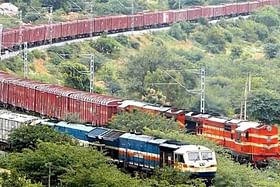These corridors will focus on upgrading track infrastructure, including the doubling of existing routes and the creation of alternative routes in order to avoid congested areas.
The Union Ministry of Railways aims to secure Cabinet approval for an investment programme of Rs 5.25 lakh crore, spanning fiscal years 2024 to 2031.
This investment is intended to enhance rail connectivity to mining regions, cement manufacturing facilities, and various consumption points, aligning with the PM Gati Shakti National Master Plan.
This investment plan is in line with an ambitious plan to establish dedicated transport corridors for energy, minerals, and cement, with the primary objective of facilitating smooth movement of coal, iron ore, bauxite, and cement.
These corridors will focus on upgrading track infrastructure, including the doubling of existing routes and the creation of alternative routes in order to avoid congested areas.
As part of the plan, existing projects that are facing cost overruns may also be combined with the corridors. This integration will help streamline the implementation process and ensure efficient use of resources.
“The enhanced allocation will give a renewed push for improving freight movement on the national transporter,” according to Economic Times report.
The plan aligns with Vision 2030, which seeks to boost the modal share of Indian Railways in freight transportation from approximately 27 per cent to 45 per cent.
“There is a need to augment connectivity to coal, iron ore, bauxite mines and cement plants of the country and also increase the railways’ carrying capacity in line with demand for cement, coal and minerals,” said an official.
The railway network plays a crucial role in the entire ecosystem as it is responsible for transporting 90 per cent of the raw materials.
By the end of 2019, the railways had transported 1,210 million tonne of the total freight basket, which amounted to 4,700 million tonne. However, their goal is to load 2,024 million tonne of the estimated 6,400 million tonne of total freight by 2024.
According to data analysed by the DPIIT, the construction of new rail lines has increased from 4 km per day in 2023 to 12 km per day, based on the Gati Shakti Masterplan.
The Railways have also planned the construction of 13,264 km of rail infrastructure projects, which is their highest ever recorded length.


